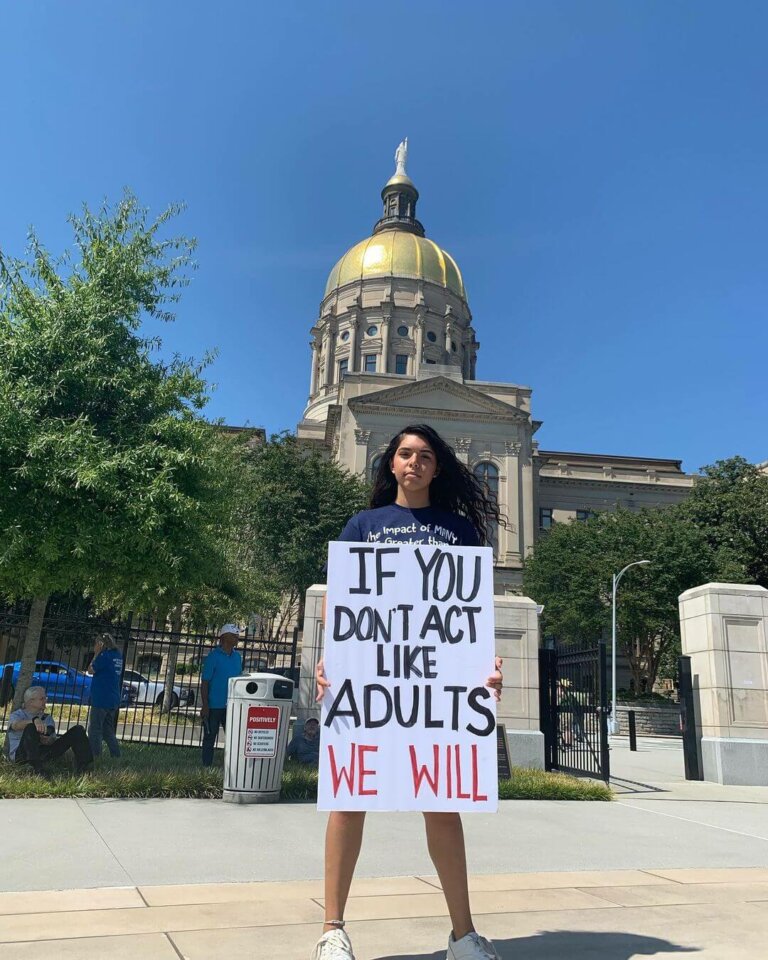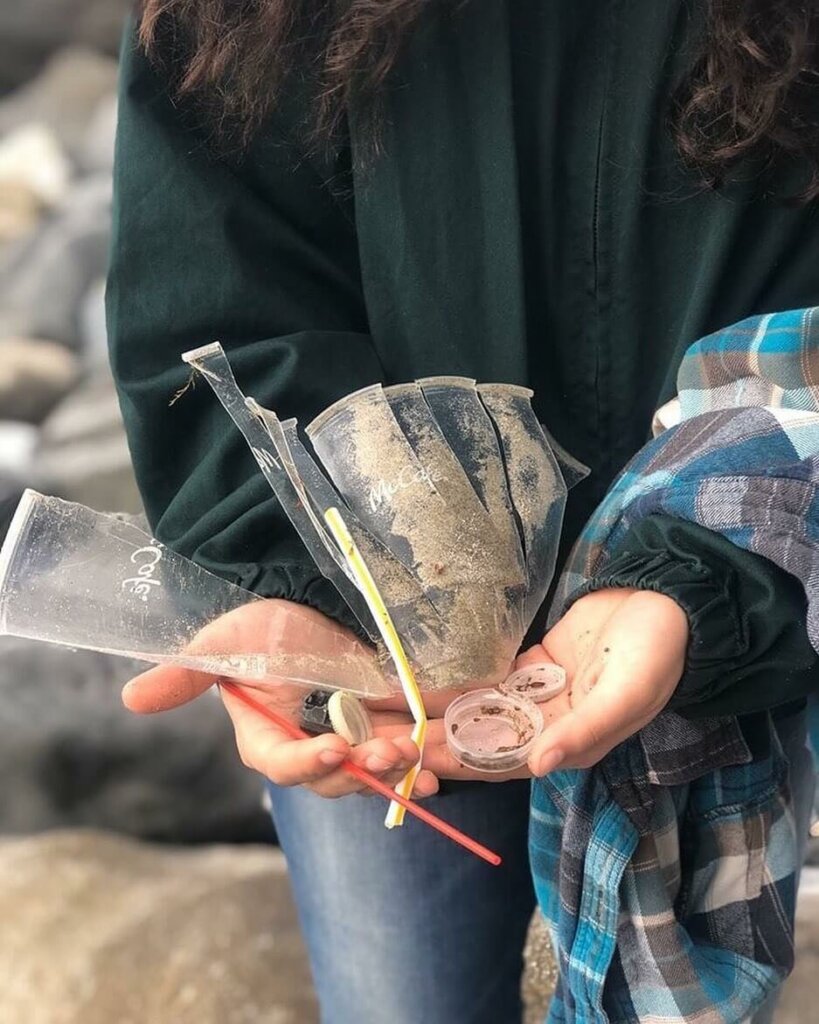INTERVIEW BRIANA DODSON @bri_dodson
ALL PHOTOS AND VIDEO COURTESY OF HANNAH TESTA @hannah4change
On December 9th you were petitioning along with other young activists for a #plasticfreepresident. Can you talk about the importance and motivation behind movement?
With the outgoing administration, there was very little action on environmental issues, especially considering the overwhelming amount of ticking time bombs. Plastic pollution is a huge contributor to climate change, and myself and other activists wanted to help tackle issues like these. Together, we created eight steps that President Joe Biden will be able to implement in his first 100 days. Now, we’re pushing to get all this research, and our proposal, on his desk.
What other memorable campaigns have you been a part of?
The first campaign that comes to mind is the Plastic Pollution Awareness Day that I was able to start in Georgia. Now, there are people from all over the U.S. that recreate the event! It’s so cool to watch people want to initiate the same things, especially when they’re things that bring awareness and education to the forefront. The whole point of the event was to educate Georgia and inspire single use plastics for one day, if not every day, and also try to inspire future legislation down the line. After all of the effort i’ve poured into this state, watching Georgia turn blue this election, the first time I could vote, was so important to me.
Can you briefly describe the connection between plastic production and climate change?
Most people see plastic pollution and issues with climate as two separate issues, but in reality, they are very linked. For one, the reliance we have on fossil fuels needs to change. 99% of plastic is made from fossil fuels and, currently, 5% of oil gets made into plastic. In 2050, that number will increase to 20%. As well, the US also contributes 300 million pounds of plastic production a year, but none of this will change if we don’t act. What we need is as many people to come together to help solve this issue as we can get.
When did eco-activism really start for you? How did Hannah4change start?
I’ve actually always been super passionate about animals and the environment. My parents instilled it in me from a young age. We even had an organic garden in my backyard with different herbs and vegetables that we would eat from. I realized most of my classmates didn’t have that and on Earth Day in kindergarten, I gave my classmates tomato plants that we’d grown. When I was around 10-years-old, I started thinking about animals that could go extinct during my lifetime, which was so crazy to me! I started going online and finding organizations to become a part of, and the first campaign I remember getting involved with was helping endangered rhinos in Africa. Since then, I’ve always looked into different organizations and campaigns that I could help out with. Through work with endangered animals, I found out about plastic pollution and that’s when Hannah4change started. I remember when plastic pollution wasn’t as mainstream of a topic as it is today, and I watched Plastic Paradise. I felt a lot of guilt for how I’d contributed and plastic that I’d used, but I also realized that most people didn’t want to be a part of this problem, they just didn’t know how to be the solution.
You recently released a book about your journey. Can you talk about how “Taking on the Plastics Crisis” came to be? What was that experience like?
I didn’t know what to expect, but it was definitely a process and a different journey than most I’ve experienced. Since I do a lot of public speaking, I learned how different writing versus talking is. Conveying information is harder on paper, and I experienced a lot of frustration with wanting to write exactly what I was feeling, but realizing I couldn’t. In the end, it just made writing that much more intentional. I’ve done a lot of interviews in articles, and I remember I was in Parade magazine in 2019. The book came about because a publisher from Penguin loved the article, especially the idea I’d discussed about adding two R’s – Refuse and Raise Awareness – to Reduce, Reuse, Recycle. We got on a call a couple weeks later about writing a book and I loved the idea. Over the next several months, I did a lot of research, planning and writing. Since the book is part of a series, all of the books are written about different activists on different topics. My book, “Taking on the Plastic Crisis”, talks about environmental activism, plastic pollution, and why recycling and clean ups are good, but aren’t the only solution. It also discusses solutions, and shares stories of young people and how they’re tackling issues.
What are a few ways you started eliminating plastic use from your life and how can others get started?
In the beginning, I started by getting rid of plastic straws, plastic water bottles, plastic reusable containers, replacing things with glass, bringing around cutlery, the basics! Now that I’m more advanced, I carry around my own bamboo set. When it came to clothing, I stopped buying polyester. I also replaced some of my cosmetics for more sustainable options, as well as swapped my toothbrush for a bamboo toothbrush. One of my favorite hacks are using the chewable toothpaste tabs!
Corporate sustainability is incredibly important to you. What’s your approach to talking to businesses about being more sustainable?
I usually start by talking to them about plastic pollution and then segue into what they can do as a business. Plastic is mostly used in packaging, so that’s always a good area to start, but other seemingly minor issues, like the presence of microbeads in cosmetics and scrubs, are actually big issues. Greenwashing is also such a big issue, I always encourage the use of actual ethical and sustainable ingredients as most businesses need to set goals, not mislead. They need to stick to their missions and have big steps that warrant bigger impacts because at the end of the day, people want to support businesses that are doing actual good.

How (and why) did you make the decision to become vegan?
I first became vegetarian around age seven or eight out of my love for animals. I didn’t want to eat my friends. My family had already switched out the milk we were drinking, because of my brother’s allergies, but they were still eating meat for a while and my grandma would always say “you don’t eat meat?! Why?!” Eventually, I cut off all animal products after my mom and I went to an animal rights conference. It was a very intense couple of days, and we were discussing a very heavy topic, but I learned so much. We went to a pig vigil and it was absolutely heartbreaking. We saw pigs getting loaded on trucks and I remember one pig squealed so loudly, I was just sobbing the whole time. It was a pivotal moment for me, even though it was such a devastating experience. Everyone there was so sweet, going around giving each other hugs, there was a lot of love that night. So, I would say that my diet started out with my love for animals, but it also helps the environment in a lot of ways.
What does “sustainability” mean to you and what are some of the misconceptions you’ve heard?
I think sustainability overall includes initiatives that better protect our planet and the resources out there that are available to us. We need better policy and initiatives that protect what we have now, so there’s more down the line. One of the biggest misconceptions is that there’s only one solution or one way of doing things, which could be seen as good or bad. People are able to get creative with figuring out how to come up with these solutions, or they can tackle them in different ways. There’s a quote that one of my friends said to me that really hits me; “The weight of the world is not as heavy if we all lift it together.” The good news is that we can all contribute in our own ways.
What’s your why? If nothing else, why should others care about sustainability and protecting the planet?
There’s a quote I love by Robert Swan that says, “The greatest threat to our planet is that someone else will save it.” Whether we believe it or not, we all play such a huge role, and that role can look different for everyone. Voting on a ballet, writing letters, making your voice heard and making shifts in your daily life, these are all roles we can play. It’s all about educating yourself and finding how you can get involved. Maybe you’re a public speaker, maybe you love art or film. Whatever it is, ask yourself what can I do? And then do it.

| Cookie | Duration | Description |
|---|---|---|
| cookielawinfo-checkbox-analytics | 11 months | This cookie is set by GDPR Cookie Consent plugin. The cookie is used to store the user consent for the cookies in the category "Analytics". |
| cookielawinfo-checkbox-functional | 11 months | The cookie is set by GDPR cookie consent to record the user consent for the cookies in the category "Functional". |
| cookielawinfo-checkbox-necessary | 11 months | This cookie is set by GDPR Cookie Consent plugin. The cookies is used to store the user consent for the cookies in the category "Necessary". |
| cookielawinfo-checkbox-others | 11 months | This cookie is set by GDPR Cookie Consent plugin. The cookie is used to store the user consent for the cookies in the category "Other. |
| cookielawinfo-checkbox-performance | 11 months | This cookie is set by GDPR Cookie Consent plugin. The cookie is used to store the user consent for the cookies in the category "Performance". |
| viewed_cookie_policy | 11 months | The cookie is set by the GDPR Cookie Consent plugin and is used to store whether or not user has consented to the use of cookies. It does not store any personal data. |